2016年8月英语教学社会实践报告范文
英语专业社会实践报告
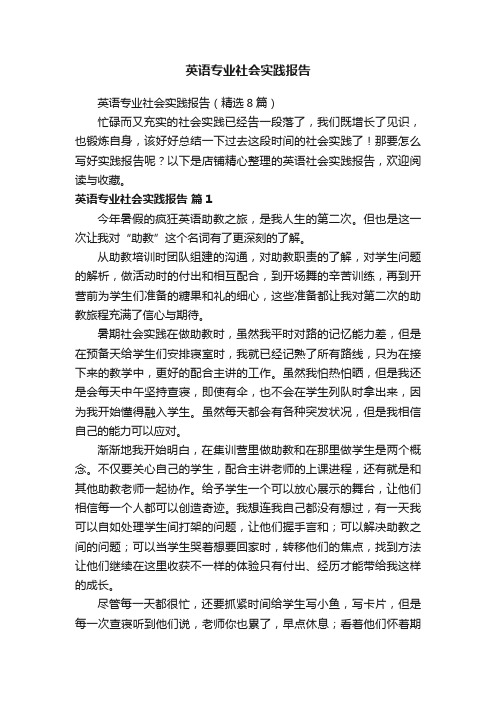
英语专业社会实践报告英语专业社会实践报告(精选8篇)忙碌而又充实的社会实践已经告一段落了,我们既增长了见识,也锻炼自身,该好好总结一下过去这段时间的社会实践了!那要怎么写好实践报告呢?以下是店铺精心整理的英语社会实践报告,欢迎阅读与收藏。
英语专业社会实践报告篇1今年暑假的疯狂英语助教之旅,是我人生的第二次。
但也是这一次让我对“助教”这个名词有了更深刻的了解。
从助教培训时团队组建的沟通,对助教职责的了解,对学生问题的解析,做活动时的付出和相互配合,到开场舞的辛苦训练,再到开营前为学生们准备的糖果和礼的细心,这些准备都让我对第二次的助教旅程充满了信心与期待。
暑期社会实践在做助教时,虽然我平时对路的记忆能力差,但是在预备天给学生们安排寝室时,我就已经记熟了所有路线,只为在接下来的教学中,更好的配合主讲的工作。
虽然我怕热怕晒,但是我还是会每天中午坚持查寝,即使有伞,也不会在学生列队时拿出来,因为我开始懂得融入学生。
虽然每天都会有各种突发状况,但是我相信自己的能力可以应对。
渐渐地我开始明白,在集训营里做助教和在那里做学生是两个概念。
不仅要关心自己的学生,配合主讲老师的上课进程,还有就是和其他助教老师一起协作。
给予学生一个可以放心展示的舞台,让他们相信每一个人都可以创造奇迹。
我想连我自己都没有想过,有一天我可以自如处理学生间打架的问题,让他们握手言和;可以解决助教之间的问题;可以当学生哭着想要回家时,转移他们的焦点,找到方法让他们继续在这里收获不一样的体验只有付出、经历才能带给我这样的成长。
尽管每一天都很忙,还要抓紧时间给学生写小鱼,写卡片,但是每一次查寝听到他们说,老师你也累了,早点休息;看着他们怀着期待的眼神询问,我寒假还来不来当助教;下课时,听见学生们“老师”“老师”的叫声,让我觉得一切都是值得的。
除此之外,离营后每一次手机响起,是学生的问候,都会让我欣喜不已点点滴滴温暖着我,让我辛苦并快乐着,一切都是值得的。
暑期英语家教社会实践报告5篇

暑期英语家教社会实践报告5篇第一篇:暑期英语家教社会实践报告暑期英语家教社会实践报告漫长的暑期生活,炎炎夏日激起了我要参加暑假社会实践的决心,说老实话这个想法早就在学期结束之前就有打算了。
回想当初刚跨进大学校门的那天我就下定决心要做一个独立自强的新一代好青年,我要学会通过自己的双手和大脑去创造属于自己的未来!现如今我终于骨气勇气抓住难得的机会接受挑战,我想只有通过亲身体验社会实践才能让我更进一步地了解和认知这个社会,以前的我只是一株生活在爸妈这两棵大树之下的小树苗,过着一种无忧无虑的生活,没有烦恼,没有忧愁,只有阳光和雨露。
然而现在我长大了,自然要寻找自身与外界的差距,检验自己是否能够融入这个复杂而庞大的世界。
暑期社会实践活动是学校教育向课堂外的一种延伸也是推进素质教育进程的重要手段,可以有助于大学生接触社会,了解社会。
同时实践也是大学生学习知识锻炼才干的有效途径更是大学生回报社会的一种良好形式,是你今后人生旅程的一个重要开端。
临近放假的时候,大家都兴奋不已,纷纷讨论暑假到底干什么去。
有的想继续留在学校,直接在附近找份工作,这样既可以既远离父母过独立的生活,又可以真正的进入社会,能更快地了解并认知社会。
有的说去当家教,这样也可以过一把当老师的瘾同时也可以巩固自己的知识。
大家都显现出空前的积极性,其实我们早就对学姐学长们能够利用学习之余的时间去做兼职佩服的五体投地。
现在我们也终于轮到我们了。
回到家我跟爸妈商谈了暑假任务,他们都很支持我的决定,也赞同我在暑期里去社会实践的这个想法,我也觉得这真是一次自我锻炼的好机会。
但是由于爸妈仍然不太放心我一个人出去工作,就帮我在熟悉的人那里找了一份比较能锻炼人的工作——当家教,一方面能磨练自己的意志力,一方面有时还能锻炼自己的英语能力。
爸妈也和朋友说好了,就那我当员工一样对待,让我真正感受一下步入社会参加工作的不容易。
每天还要早起,更不容易的是每天要花一两个小时去备课,和比自己年龄小的学生交流,好像存在着某种特别的距离感,面对一遍又一遍的重复描述和他们一些离奇的问题,真的让我身心疲惫啊!赚钱的辛苦,这其中的辛酸也只能是自己亲身体会才会懂得,起初还多多少少有些新鲜感,但久而久之这些新鲜感也随着精神的困乏而渐渐地变得暗淡,甚至还让我产生不良的心理状态,说实话中途我真得想过要放弃,从此再也不想去当老师了,在家人的教导和鼓励下我开始认清自己,我不能就这么放弃了,年轻人要有积极的生活态度,要带着抱着永不言弃的誓言一步一个脚印勇敢的走下去,带着这样的决心和意志力我继续完成使命。
英语教师实践体验报告范文
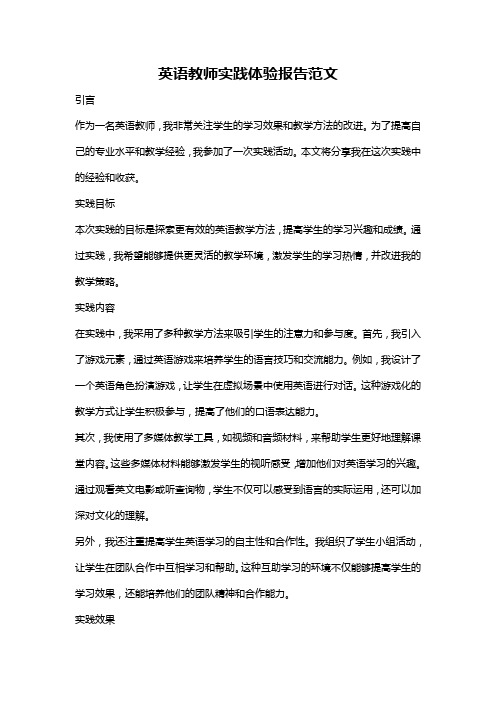
英语教师实践体验报告范文引言作为一名英语教师,我非常关注学生的学习效果和教学方法的改进。
为了提高自己的专业水平和教学经验,我参加了一次实践活动。
本文将分享我在这次实践中的经验和收获。
实践目标本次实践的目标是探索更有效的英语教学方法,提高学生的学习兴趣和成绩。
通过实践,我希望能够提供更灵活的教学环境,激发学生的学习热情,并改进我的教学策略。
实践内容在实践中,我采用了多种教学方法来吸引学生的注意力和参与度。
首先,我引入了游戏元素,通过英语游戏来培养学生的语言技巧和交流能力。
例如,我设计了一个英语角色扮演游戏,让学生在虚拟场景中使用英语进行对话。
这种游戏化的教学方式让学生积极参与,提高了他们的口语表达能力。
其次,我使用了多媒体教学工具,如视频和音频材料,来帮助学生更好地理解课堂内容。
这些多媒体材料能够激发学生的视听感受,增加他们对英语学习的兴趣。
通过观看英文电影或听查询物,学生不仅可以感受到语言的实际运用,还可以加深对文化的理解。
另外,我还注重提高学生英语学习的自主性和合作性。
我组织了学生小组活动,让学生在团队合作中互相学习和帮助。
这种互助学习的环境不仅能够提高学生的学习效果,还能培养他们的团队精神和合作能力。
实践效果通过以上实践,我观察到了一些明显的效果和变化。
首先,学生的学习兴趣明显提高,他们更加愿意参与到课堂活动中来。
自从引入了游戏化教学的方式后,学生的学习积极性明显增加,他们更加主动地使用英语与同学进行对话和交流。
其次,学生的英语口语和写作能力也得到了提高。
通过多媒体教学的方式,学生能够更容易地理解和掌握英语的语音和词汇,从而提高他们的听说能力。
此外,学生在小组活动中互相学习和合作,能够更好地提升他们的英语写作能力。
最后,在教学过程中,我也注意到了一些需要改进的地方。
例如,我发现有些学生在游戏化教学中存在过度竞争的问题,他们更关注在游戏中获胜而不是学习。
为了解决这个问题,我调整了游戏规则,并加强了对学生参与和学习的引导。
英语教学社会实践报告范文
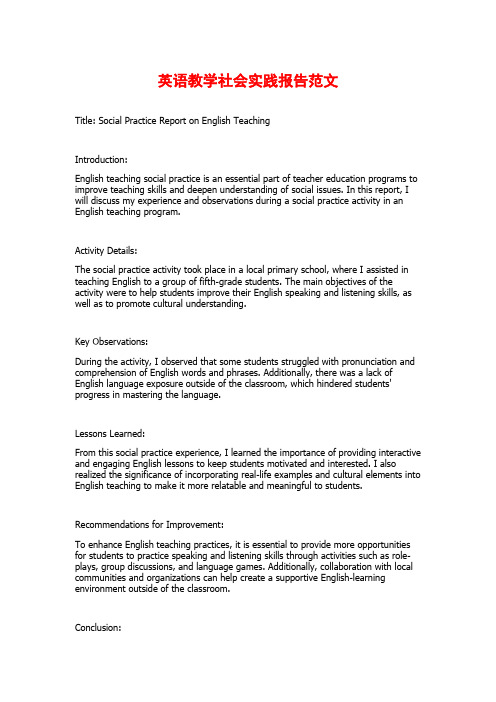
英语教学社会实践报告范文Title: Social Practice Report on English TeachingIntroduction:English teaching social practice is an essential part of teacher education programs to improve teaching skills and deepen understanding of social issues. In this report, I will discuss my experience and observations during a social practice activity in an English teaching program.Activity Details:The social practice activity took place in a local primary school, where I assisted in teaching English to a group of fifth-grade students. The main objectives of the activity were to help students improve their English speaking and listening skills, as well as to promote cultural understanding.Key Observations:During the activity, I observed that some students struggled with pronunciation and comprehension of English words and phrases. Additionally, there was a lack of English language exposure outside of the classroom, which hindered students' progress in mastering the language.Lessons Learned:From this social practice experience, I learned the importance of providing interactive and engaging English lessons to keep students motivated and interested. I also realized the significance of incorporating real-life examples and cultural elements into English teaching to make it more relatable and meaningful to students.Recommendations for Improvement:To enhance English teaching practices, it is essential to provide more opportunities for students to practice speaking and listening skills through activities such as role-plays, group discussions, and language games. Additionally, collaboration with local communities and organizations can help create a supportive English-learning environment outside of the classroom.Conclusion:Overall, the social practice activity in English teaching was a valuable learning experience that provided me with insights into the challenges and opportunities in language education. By implementing the lessons learned and recommendations for improvement, I believe we can make a positive impact on English teaching and learning in the community.。
英语专业社会实践实习报告
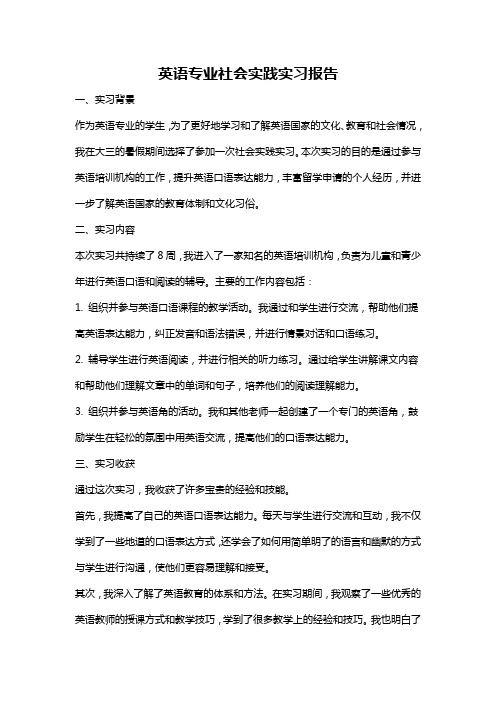
英语专业社会实践实习报告一、实习背景作为英语专业的学生,为了更好地学习和了解英语国家的文化、教育和社会情况,我在大三的暑假期间选择了参加一次社会实践实习。
本次实习的目的是通过参与英语培训机构的工作,提升英语口语表达能力,丰富留学申请的个人经历,并进一步了解英语国家的教育体制和文化习俗。
二、实习内容本次实习共持续了8周,我进入了一家知名的英语培训机构,负责为儿童和青少年进行英语口语和阅读的辅导。
主要的工作内容包括:1. 组织并参与英语口语课程的教学活动。
我通过和学生进行交流,帮助他们提高英语表达能力,纠正发音和语法错误,并进行情景对话和口语练习。
2. 辅导学生进行英语阅读,并进行相关的听力练习。
通过给学生讲解课文内容和帮助他们理解文章中的单词和句子,培养他们的阅读理解能力。
3. 组织并参与英语角的活动。
我和其他老师一起创建了一个专门的英语角,鼓励学生在轻松的氛围中用英语交流,提高他们的口语表达能力。
三、实习收获通过这次实习,我收获了许多宝贵的经验和技能。
首先,我提高了自己的英语口语表达能力。
每天与学生进行交流和互动,我不仅学到了一些地道的口语表达方式,还学会了如何用简单明了的语言和幽默的方式与学生进行沟通,使他们更容易理解和接受。
其次,我深入了解了英语教育的体系和方法。
在实习期间,我观察了一些优秀的英语教师的授课方式和教学技巧,学到了很多教学上的经验和技巧。
我也明白了英语教育并非只是学习语法和单词,更注重培养学生的语言运用能力和跨文化交际能力。
最重要的是,我与学生们建立了深厚的友谊。
在实习期间,我与许多活泼可爱的孩子们相处了很长时间,我们共同度过了很多有趣的时刻。
这种互动不仅提升了我的教学能力,也帮助我更好地了解了青少年的心理需求和教育问题。
四、实习心得通过这次实习,我收获了很多,也面临了一些挑战。
首先,教学能力的提升是一个重要的挑战。
在实习初期,我发现我在授课和讲解时有时会有些结巴,无法很好地传达自己的意思。
英语教育实习报告范文14篇

英语教育实习报告英语教育实习报告范文14篇随着社会不断地进步,我们使用报告的情况越来越多,报告中提到的所有信息应该是准确无误的。
那么一般报告是怎么写的呢?以下是小编整理的英语教育实习报告范文,仅供参考,希望能够帮助到大家。
英语教育实习报告范文篇1我实习的学校是一所小学。
学校的操场,小花园,甚至是几间教室,都弥漫着活泼的气息。
实习的日子,自然也增添了不少情趣。
到学校报道后,我的带教老师是周业梅老师。
她教学经验丰富,待人很好。
学校里的老师都说她的课讲得很好。
学校领导说,应该多向周老师请教。
之后的时间,还来不及适应新的环境,我就被周老师领到了班级,当时想到就要面对四五十个学生,不免还是有点担心和紧张。
实习老师,是个很特别的存在。
还记得第一次被班级里学生叫“老师好”的时候的那种错愕。
渐渐适应,然后自如反应,点头示意。
开始的一个礼拜,日渐习惯起学校的生活,仿佛重回小学校园一般。
用以一种全新的角度来看待学生,以老师的身份来要求自己了,这种感觉挺奇妙。
以往觉得“高高在上”的老师,突然间成了身边的“同事”,作为实习老师,又该以怎样的态度去面对高中的学生?身份的转变,是实习阶段第一个要跨越的坎吧?正确认识自己的身份:带教老师的'学生,小学学生的老师。
而自己的实习生涯也在这里拉开了序幕……听课。
这是实习的必经阶段,听课不仅能够学习带教老师的教学方法,也能熟悉自己将要教学的班级。
小学阶段的英语课程与大学里大不相同,他们要的不是文章的思想内涵,而是一种能听、说、读的技能。
带教的周老师教态很好,课程安排上面相当严谨,备课很充分。
听第一节课的时候就觉得整节课早已经规划好了似的,大部分学生都知道了这节课要完成的内容。
就算有突发状况的发生,老师学生也都能自行控制好时间。
学校规定的听课是10节左右,我基本上能去听的课都去了,为的是想了解整个章节上课的完整过程,每个部分都有不同的上课手段和形式。
这些,都是值得我学习的地方。
英语教学的实习报告范文5篇

英语教学的实习报告范文5篇英语教学的实习报告篇1两周的教学实习,使我对教学的相关环节有了基本的认识。
从第一次踏上讲台,到慢慢适应老师这个角色,找到当老师的感觉,每一步都充满了惊喜。
而对于教学及学生,也开始有了基于实践的认识。
现总结如下:一:备课在所有教学环节中,备课是最基础的一环节。
从确定上课内容,到一份完整教案的确定,当中需要不断地修改修正。
备听说课时,遇到的主要困难是不知道该如何有效地把各部分连接起来,既不能显得过于唐突,又不能过于拖沓。
而有时候,教案的确定于我们新的实习老师而言,是需要灵感和生活经验的。
之前对于有效组织听说第三单元课文中散落的单词,语句,对话,一筹莫展。
可当我把自己置身于学生的位置,考虑到当他们来到一个陌生的英语环境点餐时,大概是怎么一个流程,课文各内容之间的组合整装方式便出来了——既然是讲食物讲就餐,那么完全就可以按照整个就餐的流程,从确定吃什么,到哪儿吃,怎么点餐,怎么吃等几个方面入手。
而事实证明,这样的一个教学思路下来,学生能明白他们需要做什么能学到什么,并且能看到很实际的效果。
对于精读课,备课的难度就大得多。
因为上的是第一堂导入课,主要任务是介绍尽量详细的背景知识,调动学生对课文主题的兴趣,减少课文理解的难度。
精读课第四单元的主题是关于爱情。
这个话题,能用的素材很多,可以从小说,电影,历史等各角度入手。
而学生也正处于风华月貌的年龄,对于爱情肯定有过他们的憧憬,或者有过直接的体会,因此也会有话说。
可正因为素材太多,素材的选择又成了一个问题。
最后,确定下来,从音乐,诗歌,电影三个方面导入,再让学生小组讨论,交流对于爱情的认识和心得。
这样下来,整堂课的内容就丰满起来了。
二:上课上课是教学实习的中心环节,也是我收获最大的一个环节。
通过几次的教学,我最大的成就感是收获了一份自信和坚定。
以前总觉得自己是个腼腆内向的人,对于当大学老师这个梦想多少有些怀疑。
可当我站到讲台上,面对底下那么多望着你的学生,除去刚开始的几分钟,我竟然一点都不紧张。
英语教育实习报告范文5篇
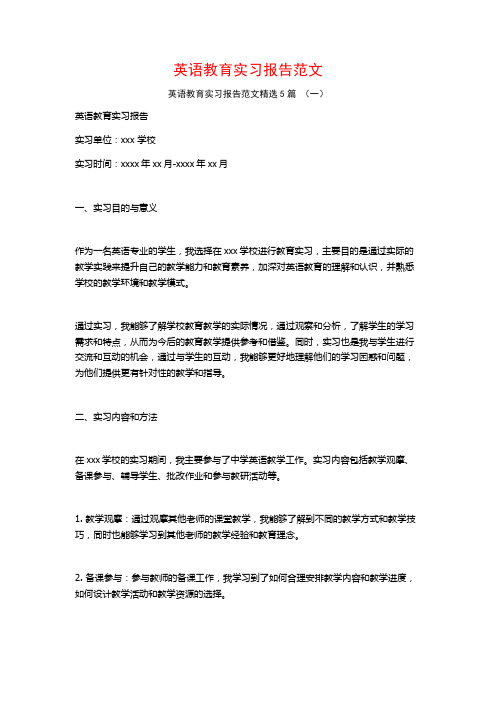
英语教育实习报告范文英语教育实习报告范文精选5篇(一)英语教育实习报告实习单位:xxx 学校实习时间:xxxx年xx月-xxxx年xx月一、实习目的与意义作为一名英语专业的学生,我选择在xxx学校进行教育实习,主要目的是通过实际的教学实践来提升自己的教学能力和教育素养,加深对英语教育的理解和认识,并熟悉学校的教学环境和教学模式。
通过实习,我能够了解学校教育教学的实际情况,通过观察和分析,了解学生的学习需求和特点,从而为今后的教育教学提供参考和借鉴。
同时,实习也是我与学生进行交流和互动的机会,通过与学生的互动,我能够更好地理解他们的学习困惑和问题,为他们提供更有针对性的教学和指导。
二、实习内容和方法在xxx学校的实习期间,我主要参与了中学英语教学工作。
实习内容包括教学观摩、备课参与、辅导学生、批改作业和参与教研活动等。
1. 教学观摩:通过观摩其他老师的课堂教学,我能够了解到不同的教学方式和教学技巧,同时也能够学习到其他老师的教学经验和教育理念。
2. 备课参与:参与教师的备课工作,我学习到了如何合理安排教学内容和教学进度,如何设计教学活动和教学资源的选择。
3. 辅导学生:在课余时间,我为学生提供了英语辅导和解答学习问题的帮助,这不仅为学生提供了额外的学习机会,也让我更深入地了解学生的学习状况和问题。
4. 批改作业:我参与了教师批改学生作业的工作,通过批改作业,我能够了解学生的学习情况和进步,同时也为学生提供及时的反馈和指导。
5. 参与教研活动:学校组织了一系列的教研活动,我积极参与,与其他教师一起讨论教学问题和交流教学经验,借此提升自己的教学水平。
三、实习心得和收获通过这段时间的实习,我对英语教育有了更深入的了解和认识。
我发现,教师不仅需要具备扎实的英语语言基础和教学能力,还需要具备良好的沟通能力和教育素养,关注学生的学习需求和个性发展,积极引导和鼓励学生,激发他们的学习兴趣和潜力。
同时,我还发现,在实际的教学过程中,教师需要灵活运用各种教学方法和教学资源,通过情境教学、课堂讨论、小组合作等方式激发学生的积极性和主动性,培养他们的综合语言运用能力和学习策略。
英语教育实习报告(通用14篇)

英语教育实习报告英语教育实习报告(通用14篇)英语教育实习报告篇1一、前言实习是大学生必经一个阶段,是我们踏入社会的第一步,是人生的另一个起点,对我们的生涯规划有着重要的意义。
通过实习,使我们在社会实践中接触与本专业相关的实际工作,巩固英语专业的主要知识,丰富实际工作和社会经验,将所学知识用于实际工作,把理论和实践结合起来,提高实践动手能力,为我们毕业后走上工作岗位打下一定的基础;同时可以检验教学效果,为进一步提高教育教学质量,培养合格人才积累经验,并为自己能顺利与社会环境接轨做准备。
这次实习对我来说又有着特殊的意义,我怀着一半欣喜一半忐忑的心情来到实习学校——虎山小学。
短短的2个月实习生活(20xx.01-20xx.4.30)转瞬即逝,在这收获的季节里,我取得了意想不到的成绩,获得了宝贵的经验。
在实习中,我一直以教师身份严格要求自己,处处注意言行和仪表,热心爱护实习学校和班级学生,本着对学生负责的态度尽力做好实习工作;作为实习生一员,一直紧记实习守则,遵守实习学校的规章制度,尊重学校领导和老师,虚心听取他们的意见,学习他们的经验,主动完成实习学校布置的任务,塑造了良好的形象,给实习学校的领导、老师和学生都留下了好的印象,得到学校领导和老师的一致好评。
二、实习经历1. 听课在这短暂的实习期间,我主要进行了英语教学工作的实习。
第一、二周我主要以听课为主。
听课是一个铺垫,是一个向他人学习、模仿的过程。
听课的关键是如何把从别人身上学到的东西转化为自己的东西。
小学阶段的英语课程与大学里大不相同,学生们要的不是文章的思想内涵,而是一种能听、说、读的技能。
Miss Guo是整个低年级的英语老师,她教态很好,课程安排上面相当严谨, 备课很充分。
听第一节课的时候就觉得整节课早已经规划好了似的,大部分学生都知道了这节课要完成的内容。
就算有突发状况的发生,老师学生也都能自行控制好时间。
学校规定的听课是10节左右,我基本上能去听的课都去了, 为的是想了解整个章节上课的完整过程, 每个部分都有不同的上课手段和形式。
英语教学的社会实践(3篇)
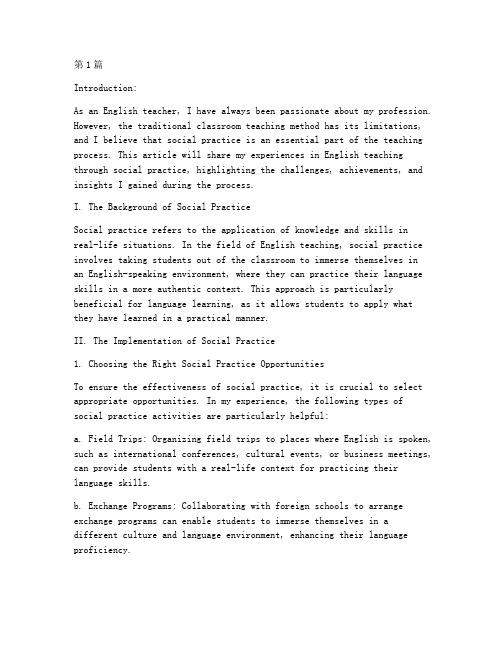
第1篇Introduction:As an English teacher, I have always been passionate about my profession. However, the traditional classroom teaching method has its limitations, and I believe that social practice is an essential part of the teaching process. This article will share my experiences in English teaching through social practice, highlighting the challenges, achievements, and insights I gained during the process.I. The Background of Social PracticeSocial practice refers to the application of knowledge and skills inreal-life situations. In the field of English teaching, social practice involves taking students out of the classroom to immerse themselves inan English-speaking environment, where they can practice their language skills in a more authentic context. This approach is particularly beneficial for language learning, as it allows students to apply what they have learned in a practical manner.II. The Implementation of Social Practice1. Choosing the Right Social Practice OpportunitiesTo ensure the effectiveness of social practice, it is crucial to select appropriate opportunities. In my experience, the following types ofsocial practice activities are particularly helpful:a. Field Trips: Organizing field trips to places where English is spoken, such as international conferences, cultural events, or business meetings, can provide students with a real-life context for practicing their language skills.b. Exchange Programs: Collaborating with foreign schools to arrange exchange programs can enable students to immerse themselves in adifferent culture and language environment, enhancing their language proficiency.c. Volunteering: Encouraging students to participate in volunteer activities, such as teaching English to underprivileged children or assisting in community events, can help them develop a sense of social responsibility and improve their language skills simultaneously.2. Preparing Students for Social PracticeBefore engaging in social practice, it is essential to prepare students adequately. This involves:a. Providing guidance on cultural norms and etiquette in the target language environment.b. Equipping students with the necessary language skills and knowledge required for the social practice activity.c. Conducting pre-activity training sessions to enhance students' confidence and communication skills.III. Challenges and Solutions1. Cultural DifferencesOne of the primary challenges in social practice is dealing with cultural differences. To address this, I have taken the following measures:a. Conducting cultural awareness workshops to familiarize students with different cultural practices.b. Encouraging students to ask questions and be open-minded about new experiences.2. Language BarriersLanguage barriers can hinder effective communication during social practice. To overcome this challenge:a. Pairing students with language partners who can provide assistance when needed.b. Providing a dictionary or translation tool for students to use during the activity.3. Student EngagementKeeping students engaged throughout the social practice activity can be challenging. To address this, I have implemented the following strategies:a. Incorporating interactive and fun activities into the social practice program.b. Encouraging students to share their experiences and reflect on their learning outcomes.IV. Achievements and Insights1. Improved Language ProficiencyThrough social practice, my students have demonstrated significant improvements in their language proficiency. They have become more confident in using English in real-life situations and have developed a better understanding of the language's cultural context.2. Enhanced Critical Thinking and Problem-Solving SkillsEngaging in social practice activities has helped students develop critical thinking and problem-solving skills. They have learned to adapt to new situations, communicate effectively, and overcome language barriers.3. Increased Social ResponsibilitySocial practice has instilled a sense of social responsibility in my students. They have become more aware of the importance of language as a tool for global communication and have developed a desire to contribute to the betterment of society.Conclusion:Social practice is an invaluable component of English teaching. By providing students with real-life opportunities to practice theirlanguage skills, we can help them become more proficient, confident, and socially responsible individuals. As an English teacher, I will continue to incorporate social practice into my teaching methodology, believing that it is an essential aspect of language learning.第2篇Introduction:As a college student majoring in English Education, I have always been passionate about teaching and helping students improve their English skills. Last summer, I had the opportunity to participate in a social practice program organized by our university, which allowed me to work as an English teacher in a rural primary school. This experience was truly eye-opening and rewarding, as I got to apply my knowledge and skills in a real-life teaching environment. In this essay, I will share my social practice experience in English teaching, focusing on the challenges I faced, the strategies I employed, and the impact of the program on both the students and myself.Background:The rural primary school where I conducted my social practice was located in a remote mountainous area. The school had limited resources, and the students came from poor families. Most of them had little exposure to English, and their English proficiency was very low. The program aimed to improve the students' English language skills and provide them with a better understanding of the world beyond their village.Teaching Methods:During my time at the school, I taught English to students from grades 1 to 5. To cater to the diverse needs of the students, I employed various teaching methods, including:1. Communicative Approach: I encouraged students to speak English in class and used real-life situations to make the learning experience moreengaging. For example, I would ask students to describe their daily activities, introduce themselves, or talk about their favorite animals.2. Games and Activities: To make the learning process more enjoyable, I incorporated games and activities into my lessons. These included word searches, crosswords, charades, and group discussions.3. Storytelling: I used storytelling to help students improve their listening and speaking skills. By telling stories and asking students to retell them, I could assess their comprehension and encourage them to express themselves.4. songs and rhymes: I introduced songs and rhymes to help students memorize new vocabulary and improve their pronunciation. This approach made learning English more fun and interactive.Challenges:Teaching in a rural primary school presented several challenges. Some of the key challenges I faced were:1. Language Barrier: Many students had little exposure to English, and it was challenging for them to understand and speak the language. To overcome this, I had to simplify my instructions and use gestures and facial expressions to convey my message.2. Limited Resources: The school had limited resources, such as textbooks, teaching materials, and technology. This made it difficult to create engaging and interactive lessons. However, I managed to make do with the resources available and used creativity to enhance my teaching.3. Student Engagement: Some students were initially hesitant to participate in class activities. To encourage them, I made sure to provide positive reinforcement and individual attention, focusing on their strengths and progress.Impact:The social practice program had a significant impact on both the students and myself. Here are some of the key outcomes:1. Improved English Skills: By the end of the program, the students' English language skills had significantly improved. They were more confident in speaking and listening to English, and they could understand and use basic vocabulary.2. Enhanced Self-Confidence: The students gained a sense of achievement and self-confidence as they saw their progress in English. This boost in confidence extended to other areas of their lives, such as their schoolwork and social interactions.3. Personal Growth: For me, the experience was a valuable opportunity to develop my teaching skills and gain a deeper understanding of the challenges faced by students in rural areas. I learned to be more patient, resourceful, and creative in my teaching methods.Conclusion:My social practice experience in English teaching was an unforgettable and enriching journey. It allowed me to apply my knowledge and skills in a real-life teaching environment and make a positive impact on the lives of the students. The challenges I faced taught me valuable lessons, and the success stories of the students motivated me to continue my journeyin education. I am grateful for this opportunity and look forward to contributing to the field of English education in the future.第3篇Introduction:As an English major student, I had the opportunity to participate in a social practice program organized by our university. The program aimedto improve the English proficiency of students in a rural primary school, which provided me with an invaluable experience in English teaching.This essay will discuss my experiences, challenges, and reflections during the social practice period.I. Preparing for the Social Practice1. Selection of Teaching MaterialBefore the social practice, I spent a considerable amount of time selecting suitable teaching materials for the students. Consideringtheir age and level of English proficiency, I chose a variety of teaching resources, including storybooks, songs, and educational games.2. Lesson PlanningI carefully planned each lesson, focusing on different aspects of English language learning, such as vocabulary, grammar, listening, speaking, and writing. My goal was to make the lessons engaging and interactive, ensuring that the students would enjoy learning English.II. The Teaching Process1. Class ManagementThe first challenge I encountered was class management. As a beginner teacher, I had difficulty maintaining order in the classroom. However, with the help of the school principal and my colleagues, I gradually learned how to manage the class effectively. I established rules and consequences, and I made sure to reward good behavior.2. Interaction with StudentsInteracting with the students was another significant challenge. Initially, I found it challenging to connect with them and make themfeel comfortable. However, as the days went by, I learned to adapt my teaching style to their needs. I encouraged them to participate in class activities, and I made sure to praise their efforts and achievements.3. Adaptation to the Local EnvironmentThe rural primary school I taught at had limited resources and facilities. This required me to be creative and resourceful in my teaching methods. For instance, I used the local environment as a teaching tool, taking the students on nature walks and using the surrounding scenery to teach them new vocabulary.III. Reflections1. Personal GrowthThe social practice program provided me with an excellent opportunityfor personal growth. I learned how to be patient, adaptable, and resourceful in challenging situations. I also gained a deeper understanding of the importance of education and the impact it can have on a child's life.2. Professional DevelopmentTeaching in the rural primary school allowed me to apply the theoretical knowledge I had acquired during my studies. It helped me improve my teaching skills and develop a better understanding of language learning and teaching.3. Social ResponsibilityThe social practice program emphasized the importance of social responsibility. By contributing to the education of underprivileged children, I felt a sense of fulfillment and purpose. It made me realize that everyone has the power to make a positive impact in society.Conclusion:In conclusion, my English teaching social practice experience was an unforgettable and rewarding one. It taught me valuable lessons about personal growth, professional development, and social responsibility. I am grateful for the opportunity to have participated in this program and to have made a positive difference in the lives of the students I taught.。
英语教育社会实践报告3000字

英语教育社会实践报告3000字全文共3篇示例,供读者参考篇1English Education Social Practice ReportIntroductionThe English education social practice is an essential part of the comprehensive education for students. It provides a platform for students to apply their English language skills and knowledge in real-life situations, enhancing their understanding and proficiency in the language. In this report, I will discuss my experience and reflections on participating in an English education social practice program.Participating OrganizationI joined the English education social practice program organized by a local non-profit organization that aims to promote English education in underprivileged communities. The program involved teaching English to elementary school students in a rural village every weekend for a period of three months.Activities and ResponsibilitiesDuring the program, my responsibilities included preparing lesson plans, teaching English grammar and vocabulary, conducting interactive activities, and organizing cultural exchange events. I also participated in one-on-one tutoring sessions and assisted with the organization of a community English fair.Challenges and OpportunitiesOne of the main challenges I faced during the program was the language barrier between the students and me. Many of the students had limited English proficiency, which made it difficult for them to understand complex grammar rules and vocabulary. However, this challenge provided me with the opportunity to develop alternative teaching methods, such as using visual aids, games, and role-playing exercises to make the lessons more engaging and accessible for the students.Results and ImpactThrough my participation in the English education social practice program, I was able to witness the positive impact of English education on the students' academic performance and personal development. Many of the students showed significantimprovement in their English language skills, and their confidence and enthusiasm for learning also increased. The program also fostered a sense of community and collaboration among the students, teachers, and volunteers, creating a supportive and inclusive learning environment.Reflections and Lessons LearnedParticipating in the English education social practice program was a valuable learning experience for me. It taught me the importance of empathy, patience, and adaptability in teaching and communication. I also learned the significance of community engagement and volunteerism in promoting education and social equality. Overall, the program deepened my understanding of the role of English education in empowering individuals and communities, and inspired me to continue to contribute to such initiatives in the future.ConclusionIn conclusion, the English education social practice program provided me with a meaningful and enriching experience that not only enhanced my English language skills but also broadened my perspective on education, society, and the power of community engagement. I am grateful for the opportunity toparticipate in this program and look forward to continuing to make a positive impact through English education in the future.篇2English Education Social Practice ReportIntroductionIn recent years, the importance of social practice in the field of English education has been widely recognized. Engaging in social practice not only helps students apply what they have learned in the classroom to real-life situations, but also fosters a sense of social responsibility and critical thinking skills. In this report, I will discuss my experiences and reflections on participating in a social practice project related to English education.BackgroundAs a third-year English major at ABC University, I have always been passionate about teaching and learning languages. When I heard about a social practice opportunity that involved teaching English to underprivileged children in rural areas, I knew I had to sign up. The project was organized by a local NGO and aimed to improve the English proficiency of students in a small village school.ExperienceUpon arriving at the village, I was struck by the lack of resources available to the students. The school was in disrepair, with limited textbooks and no access to technology. However, the students' eagerness to learn was palpable, and I was motivated to make a difference in their lives. Alongside a group of fellow volunteers, I conducted English classes for students ranging from elementary to high school levels.I utilized various teaching methods to cater to the diverse learning needs of the students, including interactive games, group discussions, and multimedia presentations. Despite the challenges posed by the limited resources, I was able to create a positive and engaging learning environment that fostered creativity and teamwork.Throughout the project, I gained invaluable insights into the realities of education in underprivileged communities. I learned to be flexible and adaptive in my teaching approach, as well as the importance of empathy and cultural sensitivity when working with students from diverse backgrounds. Moreover, I developed strong communication and leadership skills through coordinating with other volunteers and collaborating with local teachers.ImpactThe impact of the social practice project on both the students and myself was profound. The students showed significant improvement in their English language skills, with many of them displaying a newfound confidence in speaking and writing. Furthermore, the relationships I formed with the students and the local community were incredibly rewarding. I felt a sense of fulfillment in knowing that I had made a positive impact on the lives of those who needed it most.ReflectionsParticipating in this social practice project has been a transformative experience for me. It has reinforced my passion for English education and deepened my understanding of the power of education to effect change. I have gained a newfound appreciation for the value of service and the importance of giving back to those in need. Moving forward, I am committed to continuing my engagement in social practice initiatives and making a lasting difference in the lives of others.ConclusionIn conclusion, social practice plays a crucial role in enhancing English education and promoting social responsibility. Throughmy participation in the project, I have gained valuable skills, insights, and memories that will stay with me for a lifetime. I am grateful for the opportunity to contribute to the betterment of the community and look forward to continuing my journey in service and education.篇3English Education Social Practice ReportIntroductionThe English Education Social Practice is an essential component of learning for students studying English language and culture. This report will discuss the activities, experiences, and challenges faced during the social practice and reflect on the impact it has had on the participating students.ActivitiesDuring the English Education Social Practice, students were engaged in various activities such as teaching English to local communities, organizing English language workshops, and participating in cultural exchange programs. These activities provided students with the opportunity to apply their language skills in real-life situations, interact with native speakers, and gain a deeper understanding of different cultures.One of the main activities of the social practice was teaching English to students in rural schools. This experience allowed students to develop their communication and teaching skills, as well as learn about the challenges faced by students in underprivileged areas. It also helped them appreciate the importance of education and the role of language in empowering individuals.Another activity was organizing English language workshops for local communities. Through these workshops, students were able to engage with community members and provide them with the opportunity to improve their English language proficiency. This not only benefited the participants but also helped students enhance their leadership and organizational skills.ExperiencesParticipating in the English Education Social Practice provided students with valuable experiences that helped them grow both personally and academically. The opportunity to interact with diverse groups of people and immerse themselves in different cultural settings broadened their perspectives and fostered a greater sense of empathy and understanding.Many students found the experience of teaching English to be challenging yet rewarding. They had to adapt their teachingstyles to suit the needs of the students and devise creative ways to make learning engaging and effective. This experience not only improved their communication and interpersonal skills but also instilled a sense of responsibility and dedication towards their roles as educators.The cultural exchange programs allowed students to engage with individuals from different countries and backgrounds, fostering cross-cultural understanding and appreciation. Students had the chance to participate in various cultural activities, share their own traditions, and learn from the experiences of others. This exchange of ideas and perspectives enriched their knowledge and enhanced their intercultural competence.ChallengesDespite the positive experiences gained from the English Education Social Practice, students also faced various challenges during the program. One of the main challenges was the language barrier, especially when communicating withnon-native speakers. Students had to overcome this obstacle by using different communication strategies, such as gestures, visual aids, and simplified language.Another challenge was adapting to the cultural norms and practices of the communities they were working with. Students had to be sensitive to the customs and traditions of the local populations, respect their beliefs, and avoid imposing their own cultural values. This required students to be open-minded, flexible, and willing to learn from the cultural differences they encountered.ImpactThe English Education Social Practice has had a significant impact on the participating students, both academically and personally. The practical experience gained from teaching English and engaging in cultural exchange programs has enhanced their language proficiency, communication skills, and intercultural competence. It has also increased their confidence, creativity, and critical thinking abilities.On a personal level, the social practice has instilled a sense of social responsibility, empathy, and global awareness in the students. They have gained a deeper appreciation for the importance of education, language, and cultural diversity in promoting social harmony and understanding. The experience has inspired them to work towards creating positive change intheir communities and contributing to a more inclusive and equitable society.ConclusionThe English Education Social Practice has provided students with a unique opportunity to apply their language skills in authentic contexts, interact with diverse groups of people, and gain valuable insights into different cultures. Despite facing challenges, the experience has been enriching and transformative for the students, fostering their personal growth, academic development, and social consciousness. This report highlights the significance of social practice in English education and its positive impact on students' learning outcomes and personal development.。
英语教育实习报告范文8篇_1
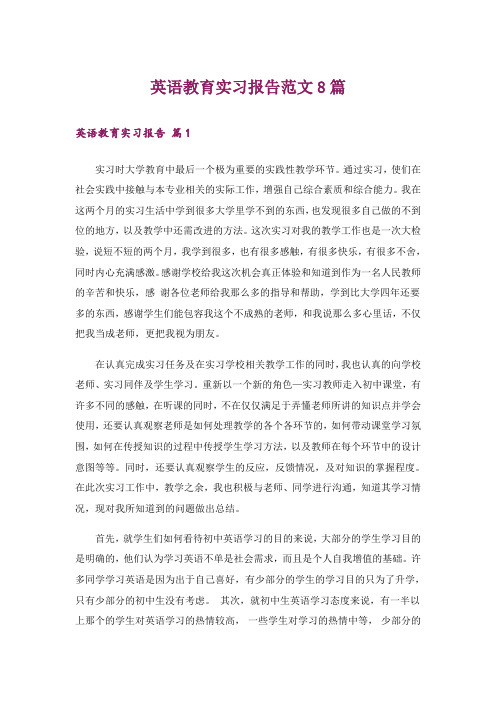
英语教育实习报告范文8篇英语教育实习报告篇1实习时大学教育中最后一个极为重要的实践性教学环节。
通过实习,使们在社会实践中接触与本专业相关的实际工作,增强自己综合素质和综合能力。
我在这两个月的实习生活中学到很多大学里学不到的东西,也发现很多自己做的不到位的地方,以及教学中还需改进的方法。
这次实习对我的教学工作也是一次大检验,说短不短的两个月,我学到很多,也有很多感触,有很多快乐,有很多不舍,同时内心充满感激。
感谢学校给我这次机会真正体验和知道到作为一名人民教师的辛苦和快乐,感谢各位老师给我那么多的指导和帮助,学到比大学四年还要多的东西,感谢学生们能包容我这个不成熟的老师,和我说那么多心里话,不仅把我当成老师,更把我视为朋友。
在认真完成实习任务及在实习学校相关教学工作的同时,我也认真的向学校老师、实习同伴及学生学习。
重新以一个新的角色—实习教师走入初中课堂,有许多不同的感触,在听课的同时,不在仅仅满足于弄懂老师所讲的知识点并学会使用,还要认真观察老师是如何处理教学的各个各环节的,如何带动课堂学习氛围,如何在传授知识的过程中传授学生学习方法,以及教师在每个环节中的设计意图等等。
同时,还要认真观察学生的反应,反馈情况,及对知识的掌握程度。
在此次实习工作中,教学之余,我也积极与老师、同学进行沟通,知道其学习情况,现对我所知道到的问题做出总结。
首先,就学生们如何看待初中英语学习的目的来说,大部分的学生学习目的是明确的,他们认为学习英语不单是社会需求,而且是个人自我增值的基础。
许多同学学习英语是因为出于自己喜好,有少部分的学生的学习目的只为了升学,只有少部分的初中生没有考虑。
其次,就初中生英语学习态度来说,有一半以上那个的学生对英语学习的热情较高,一些学生对学习的热情中等,少部分的学生则害怕学习,这与他们学习基础差,学习有畏难情绪,以及厌学的思想有关。
值得我们关注的是对英语学习兴趣较高的学生的比例在近几年有所降低,越来越多学生不知道学英语学了有什么用,在生活中完全用不上。
英专生社会实践实习报告

一、实习背景与目的随着全球化进程的不断加快,英语作为国际通用语言的重要性日益凸显。
为了提升自己的英语应用能力,加深对英语教学的理解,我选择了在我国一所知名中学进行为期一个月的社会实践实习。
此次实习旨在通过亲身体验中学英语教学,了解中学英语教学现状,提升自己的教学技能,并为将来的教育工作打下坚实基础。
二、实习单位及实习内容1. 实习单位我国某知名中学,位于我国东部沿海地区,拥有良好的教学设施和师资力量。
学校秉承“以人为本,全面发展”的教育理念,致力于培养具有国际视野的高素质人才。
2. 实习内容实习期间,我主要参与了以下工作:(1)协助英语教师备课,包括查阅资料、编写教案、制作课件等。
(2)参与课堂观摩,学习优秀教师的教学方法和技巧。
(3)协助教师进行课堂管理,包括组织课堂活动、辅导学生等。
(4)与学生进行一对一交流,了解他们的学习需求和困难。
(5)参与教研活动,与教师共同探讨英语教学中的问题。
三、实习过程及收获1. 实习过程实习期间,我严格按照实习计划,认真完成每一项工作任务。
以下是我实习过程中的几个关键阶段:(1)备课阶段:在备课过程中,我深入研究了教材内容,结合学生实际情况,制定了详细的教学计划。
同时,我还学习了优秀教师的教学方法,努力提高自己的教学水平。
(2)课堂观摩阶段:通过观摩优秀教师的教学,我学习了他们的教学技巧和课堂管理方法,为今后的教学工作积累了宝贵经验。
(3)课堂实践阶段:在教师的指导下,我尝试独立完成了一堂英语课。
在课堂实践中,我遇到了许多问题,如课堂氛围调动、学生互动等。
在教师的指导下,我不断调整教学方法,逐步提高了课堂效果。
(4)教研活动阶段:在教研活动中,我与教师们共同探讨英语教学中的问题,分享了各自的教学经验。
这些活动让我对英语教学有了更深入的理解。
2. 实习收获(1)教学技能提升:通过实习,我掌握了英语教学的基本方法和技巧,提高了自己的教学能力。
(2)课堂管理能力:在实习过程中,我学会了如何进行课堂管理,提高了自己的组织协调能力。
英语教育实习报告范文8篇_2

英语教育实习报告范文8篇英语教育实习报告篇1摘要:组成教学系统的基本要素是学生、教师与课程、客观世界(特指英语语言)。
如何把三者有机结合起来,收到最佳效果,是我实习期间一直思考的问题。
通过校外实地教学,我意识到,能否调动学生学习英语的主动性和积极性,是教学成败的关键。
所以,实习期间我就如何调动学生主动性、积极性这一问题展开了调查。
中学教育中,尤其是英语教育,应如何根据其自身特点有效地组织教学,一直是英语教育研究的重点。
组成教学系统的基本要素是学生、教师与课程、客观世界(特指英语语言)。
如何把三者有机结合起来,收到最佳效果,是我实习期间一直思考的问题。
通过校外实地教学,我意识到,能否调动学生学刁英语的主动性和积极性,是教学成败的关键。
所以,实习期间我就如何调动学生主动性、积极性这一问题展开了调查,调查对象是我任课的郑州师范学校九九(1)一(5)班的学生,调查以问卷形式进行,共收回有效答卷(1)对英语课的兴趣;(2)英语课上的主动性积极性的重要性对英语教学的影响;(5)在课堂教学中师生的角色与作用一、学习兴趣对发挥主动性、积极性的影响情况喜欢一般不喜欢人数10346101百分比41.218.440.4从上表可以看出,喜欢上英语课的和不喜欢的比例基本持平,中间部分比例很小,呈两极分化态势。
说明学生对待英语课的态度观点鲜明,它直接影响到课堂教学效果。
学生们喜欢英语课的原因主要有:认为英语课很重要,是新世纪的需要;当前就业的通行证;喜欢接触新事物。
不喜欢英语课的原因,按教师和学生自身因素从两方面分析:(一)老师因素:现今教学传授知识的手段是受英语,教会其学习方法。
教学步骤公式化,课堂上讲得多,让学生参与的少,致使学生被动接受,思维不活跃。
(二)学生自身因素:本身英语基础不好。
学得越多,越听不懂、记不住,丧失信心,从而对老师及其所教内容产生恐惧厌烦心理。
由此可见,兴趣是学习一切知识的初始原动力。
在兴趣带动下,可以有克服一切困难的勇气;如果丧失了兴趣,不仅会成为学习的阻力,还会造成心理压力,影响今后发展。
教育英语实习报告汇编5篇范文精选

教育英语实习报告汇编5篇这个暑假的7月中旬到8月中旬,我在一家英语培训机构里实习。
一个月的实习期间,我虽然有过困惑与痛苦,但受益颇多,磨练了我的耐心与细心,积累了一定的教学经验,让我对教师这一职业有了更为深刻的理解,对以后的工作有很大的影响,也真正了解了“纸上得来终觉浅,绝知此事要躬行”的涵义。
我实习的培训机构的学生以小学和初中生为主,机构地方虽然不大,但也有百来个学生,我被安排到小学阶段的班,学生有二十人左右,使用的教材为《剑桥少儿英语》。
其实自己的小学学习生涯中并没有英语课,上了初中才有,对于小学英语还是很陌生的,记得初中、高中时的英语注重的是语法和阅读,而小学阶段的英语注重的是听、说技能,让学生了解英语这一外语以打开学习英语的大门。
我了解到《剑桥少儿英语》这套教材从培养少年儿童的英语基础语言能力和语感入手,培养学生的英语语言思维能力,建立英语学习系统,为深入学习英语打下基础。
这套教材的特点是系统性强,内容贴近生活而且循序渐进,视听结合,趣味性强,儿歌、游戏丰富并且贴合学习内容,另外图画多样、精美,图画与文字紧密结合,配有练习册,非常贴合现在的小学生学习。
开始一周我的主要工作就是听课和帮助指导老师批改作业。
虽然以前也做过家教工作,但对着几十人上课还是头一次,根本没有经验,所以听课是他有所警觉,或是让学生回答问题,学生自会把注意力集中到听课上,认真听讲。
另外,黑板上的板书内容不可太多或太少,需要挑重点、难点的内容,并且精炼,写板书时速度要快,就其进行讲解时语速要慢。
抽学生回答问题或是做口头练习时要“放眼”全班,不可只集中一处,人数在三到五人为妥,先抽能基础好的同学,让其他同学多听几遍,再抽基础差的同学。
再来说说批改作业,学生的作业有教材对应的练习册和单词句子抄写、听写,我刚开始批改作业时把学生做错的地方打叉并写上正确答案,指导老师告诉我不要写上正确答案,让学生自己去改也就是让他们自己去寻找正确答案,印象会深刻很多,有利改正,如果学生不及时改正再施以小小惩罚。
8月英语教学社会实践报告范文
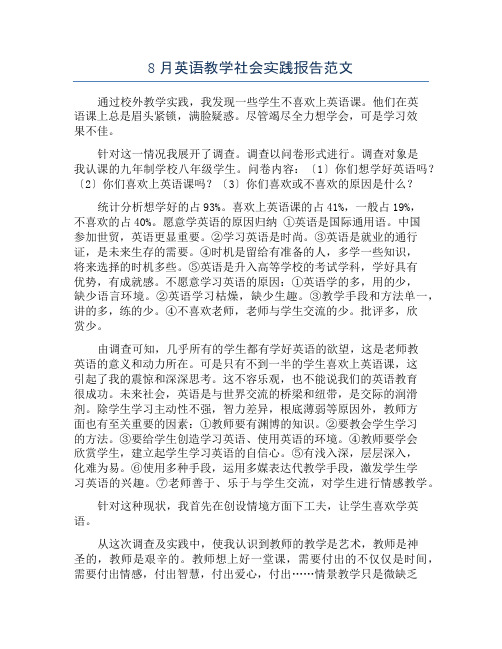
8月英语教学社会实践报告范文通过校外教学实践,我发现一些学生不喜欢上英语课。
他们在英语课上总是眉头紧锁,满脸疑惑。
尽管竭尽全力想学会,可是学习效果不佳。
针对这一情况我展开了调查。
调查以问卷形式进行。
调查对象是我认课的九年制学校八年级学生。
问卷内容:〔1〕你们想学好英语吗?〔2〕你们喜欢上英语课吗?〔3〕你们喜欢或不喜欢的原因是什么?统计分析想学好的占93%。
喜欢上英语课的占41%,一般占19%,不喜欢的占40%。
愿意学英语的原因归纳①英语是国际通用语。
中国参加世贸,英语更显重要。
②学习英语是时尚。
③英语是就业的通行证,是未来生存的需要。
④时机是留给有准备的人,多学一些知识,将来选择的时机多些。
⑤英语是升入高等学校的考试学科,学好具有优势,有成就感。
不愿意学习英语的原因:①英语学的多,用的少,缺少语言环境。
②英语学习枯燥,缺少生趣。
③教学手段和方法单一,讲的多,练的少。
④不喜欢老师,老师与学生交流的少。
批评多,欣赏少。
由调查可知,几乎所有的学生都有学好英语的欲望,这是老师教英语的意义和动力所在。
可是只有不到一半的学生喜欢上英语课,这引起了我的震惊和深深思考。
这不容乐观,也不能说我们的英语教育很成功。
未来社会,英语是与世界交流的桥梁和纽带,是交际的润滑剂。
除学生学习主动性不强,智力差异,根底薄弱等原因外,教师方面也有至关重要的因素:①教师要有渊博的知识。
②要教会学生学习的方法。
③要给学生创造学习英语、使用英语的环境。
④教师要学会欣赏学生,建立起学生学习英语的自信心。
⑤有浅入深,层层深入,化难为易。
⑥使用多种手段,运用多媒表达代教学手段,激发学生学习英语的兴趣。
⑦老师善于、乐于与学生交流,对学生进行情感教学。
针对这种现状,我首先在创设情境方面下工夫,让学生喜欢学英语。
从这次调查及实践中,使我认识到教师的教学是艺术,教师是神圣的,教师是艰辛的。
教师想上好一堂课,需要付出的不仅仅是时间,需要付出情感,付出智慧,付出爱心,付出……情景教学只是微缺乏道的一点研究,“让学生能喜欢你,喜欢上你的课”,这是我在教育生涯中研究的永恒主题。
精选英语教育实习报告范文3篇

英语教育实习报告范文3篇英语教育的同学该如何写好实习报告?大家可以把自己的实习情况和实习心得体会写到报告里哦!下面带来英语教育实习报告范文,以供参考!实习的经历虽已经过去,可我还会回头去看一下我在那里留下的脚印,我相信那不会是我旅途的归宿,而是我充满挑战和希望的开始!回顾这8天的时间我是专心的,但专心不一定等于成功,我究竟是一名实习生,在知识的构建上还存在着许多断章,还缺乏教学经验,甚至因为读错了某个英语单词或某个字后,学生把错误指出来而无地自容。
每当站在讲台上,被一双双纯净的眼睛聚精会神地望着时,作为一名教师的价值感和成就感就油然而生了。
这次实习的时间里,我并没有做到一名好老师,也不可能让所有的学生都喜欢我,但只要有一名学生记住我,那么我的第一次实习就不遗憾了。
记得那是第四天,一个学生递来一张字条:老师,我喜欢你的微笑,当你微笑着走近我时,使我感到了从来没有过的亲切,我很喜欢你。
这是我在实习里收到的最好的,最值得珍藏的礼物。
我想,其实走近学生的第一步只须微笑就够。
初为人师,总是有些紧张。
我带着羞涩与忐忑抱着课本和教案走上讲台时,尽管我做了很多预备,但当我真正面对那么多双眼睛时,我还是紧张了。
一堂准备充分的课,会令学生和老师都获益不浅。
例如我在教Unit3的时候,这课的主题是“如何询问和回答时间”,教学难度比较大。
如果照本宣科地讲授,学生会感到困难和沉闷。
为了上好这堂课,我认真研究了课文,找出了重点,难点,准备有针对性地讲。
为了令课堂生动,活跃,不沉闷,我还为此准备了大量的教具,授课时就胸有成竹了。
当讲到“half”的时候,我拿出准备好的圆卡纸,把它剪成一半,告诉学生这是圆的一半,也就是half。
讲到“quarter”时,又把半圆剪成一半,那么剩下来的就是圆的四分之一,也就是“quarter”了。
这样学生就形象地明白了这两个单词。
而讲到如何表达时间时,我用了一个用红卡纸做的大钟,同学们一开始就被它吸引住了,显得颇有积极性。
教育英语社会实践报告
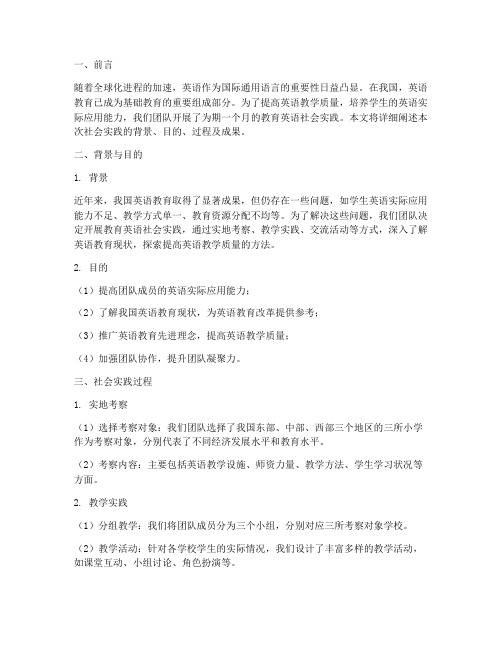
一、前言随着全球化进程的加速,英语作为国际通用语言的重要性日益凸显。
在我国,英语教育已成为基础教育的重要组成部分。
为了提高英语教学质量,培养学生的英语实际应用能力,我们团队开展了为期一个月的教育英语社会实践。
本文将详细阐述本次社会实践的背景、目的、过程及成果。
二、背景与目的1. 背景近年来,我国英语教育取得了显著成果,但仍存在一些问题,如学生英语实际应用能力不足、教学方式单一、教育资源分配不均等。
为了解决这些问题,我们团队决定开展教育英语社会实践,通过实地考察、教学实践、交流活动等方式,深入了解英语教育现状,探索提高英语教学质量的方法。
2. 目的(1)提高团队成员的英语实际应用能力;(2)了解我国英语教育现状,为英语教育改革提供参考;(3)推广英语教育先进理念,提高英语教学质量;(4)加强团队协作,提升团队凝聚力。
三、社会实践过程1. 实地考察(1)选择考察对象:我们团队选择了我国东部、中部、西部三个地区的三所小学作为考察对象,分别代表了不同经济发展水平和教育水平。
(2)考察内容:主要包括英语教学设施、师资力量、教学方法、学生学习状况等方面。
2. 教学实践(1)分组教学:我们将团队成员分为三个小组,分别对应三所考察对象学校。
(2)教学活动:针对各学校学生的实际情况,我们设计了丰富多样的教学活动,如课堂互动、小组讨论、角色扮演等。
(3)教学反思:在每次教学活动结束后,团队成员进行教学反思,总结经验教训,不断优化教学方案。
3. 交流活动(1)校际交流:我们邀请了各考察对象学校的英语教师参加交流活动,共同探讨英语教育问题。
(2)专家讲座:邀请英语教育专家为团队成员和当地英语教师进行专题讲座,分享先进的教学理念和经验。
四、社会实践成果1. 成果概述通过本次社会实践,我们团队在提高英语实际应用能力、了解英语教育现状、推广英语教育先进理念等方面取得了显著成果。
2. 具体成果(1)提高英语实际应用能力:团队成员在实践过程中,通过教学活动、交流活动等,提高了英语口语、听力、写作等实际应用能力。
教师英语社会实践报告

一、前言随着全球化的不断深入,英语作为国际通用语言的重要性日益凸显。
作为一名英语教师,我深知将理论知识与实践相结合的重要性。
为了提升自己的教学能力和专业素养,我积极参与了本次英语社会实践,通过实地考察、教学实践和交流学习,对英语教学有了更深入的理解和认识。
二、实践背景与目的1. 实践背景近年来,我国英语教育取得了显著的成果,但仍存在一些问题,如教学方法单一、学生英语实际应用能力不足等。
为了解决这些问题,我国政府和社会各界高度重视英语教育改革,不断推出新的教育政策和教学方法。
2. 实践目的(1)提升自己的教学能力,探索适合我国英语教育现状的教学方法;(2)了解英语教学的前沿动态,拓宽自己的知识视野;(3)增强与学生、家长和社会的沟通与交流,提高自己的综合素质。
三、实践内容与方法1. 实践内容(1)实地考察:走访国内外知名英语教育机构,了解其教学理念、课程设置和教学方法;(2)教学实践:在学校进行英语教学,尝试运用新的教学理念和方法,提高学生的英语学习兴趣和实际应用能力;(3)交流学习:参加英语教育研讨会,与同行交流教学心得,分享实践经验。
2. 实践方法(1)文献研究法:查阅国内外英语教育相关文献,了解英语教学的发展趋势和最新研究成果;(2)观察法:观察学生的学习状态和教师的教学行为,分析存在的问题并提出改进措施;(3)访谈法:与学生、家长和同行进行访谈,了解他们的需求和意见,为教学实践提供参考。
四、实践过程与成果1. 实践过程(1)实地考察:我先后走访了国内外多家知名英语教育机构,如英国剑桥大学、美国哈佛大学等。
通过实地考察,我了解到这些机构在课程设置、教学方法、师资力量等方面具有先进性,为我国英语教育提供了有益借鉴。
(2)教学实践:在学校进行英语教学时,我尝试运用任务型教学法、合作学习法等,激发学生的学习兴趣,提高他们的英语实际应用能力。
同时,我还关注学生的个体差异,针对不同学生的学习特点进行差异化教学。
- 1、下载文档前请自行甄别文档内容的完整性,平台不提供额外的编辑、内容补充、找答案等附加服务。
- 2、"仅部分预览"的文档,不可在线预览部分如存在完整性等问题,可反馈申请退款(可完整预览的文档不适用该条件!)。
- 3、如文档侵犯您的权益,请联系客服反馈,我们会尽快为您处理(人工客服工作时间:9:00-18:30)。
2016年8月英语教学社会实践报告范文
通过校外教学实践,我发现一些学生不喜欢上英语课。
他们在英语课上总是眉头紧锁,满脸疑惑。
尽管竭
尽全力想学会,可是学习效果不佳。
针对这一情况我展开了调查。
调查以问卷形式进行。
调查对象是我认课的九年制学校八年级学生。
问卷内容:(1)你们想学好英语吗?(2)你们喜欢上英语课吗?(3)你们喜欢或不喜欢的原因是什么?
统计分析想学好的占93%。
喜欢上英语课的占41%,一般占19%,不喜欢的占40%。
愿意学英语的原因归纳
①英语是国际通用语。
中国加入世贸,英语更显重要。
②学习英语是时尚。
③英语是就业的通行证,是未来生
存的需要。
④机会是留给有准备的人,多学一些知识,
将来选择的机会多些。
⑤英语是升入高等学校的考试学科,学好具有优势,有成就感。
不愿意学习英语的原因:①英语学的多,用的少,缺少语言环境。
②英语学习枯燥,缺少生趣。
③教学手段和方法单一,讲的多,练的少。
④不喜欢老师,老师与学生交流的少。
批评多,欣
赏少。
由调查可知,几乎所有的学生都有学好英语的欲望,这是老师教英语的意义和动力所在。
可是只有不到一半
的学生喜欢上英语课,这引起了我的震惊和深深思考。
这不容乐观,也不能说我们的英语教育很成功。
未来社会,英语是与世界交流的桥梁和纽带,是交际的润滑剂。
除学生学习主动性不强,智力差异,基础薄弱等原因外,教师方面也有至关重要的因素:①教师要有渊博的知识。
②要教会学生学习的方法。
③要给学生创造学习英语、
使用英语的环境。
④教师要学会欣赏学生,建立起学生
学习英语的自信心。
⑤有浅入深,层层深入,化难为易。
⑥使用多种手段,运用多媒体现代教学手段,激发学生
学习英语的兴趣。
⑦老师善于、乐于与学生交流,对学
生进行情感教学。
针对这种现状,我首先在创设情境方面下工夫,让
学生喜欢学英语。
从这次调查及实践中,使我认识到教师的教学是艺术,教师是神圣的,教师是艰辛的。
教师想上好一堂课,需要付出的不仅仅是时间,需要付出情感,付出智慧,
付出爱心,付出……情景教学只是微不足道的一点研究,“让学生能喜欢你,喜欢上你的课”,这是我在教育生
涯中研究的永恒主题。
